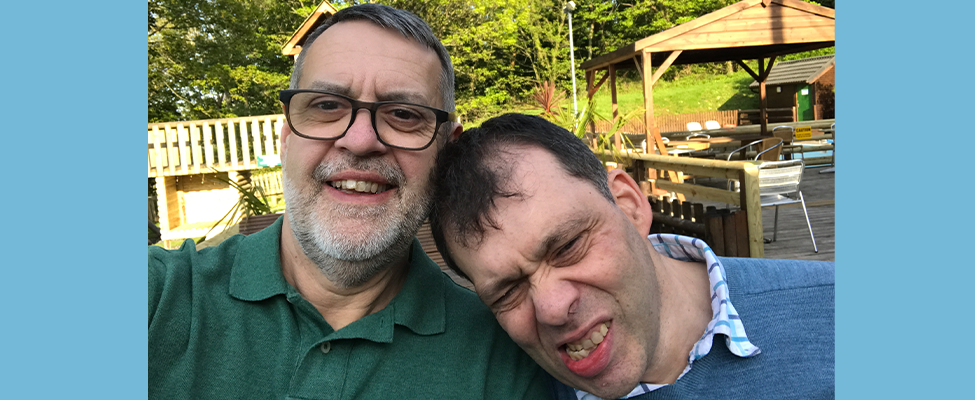
“They become like family.”
It’s not unusual to hear a support worker use this line to explain their relationship with the people they support. For many, it’s the support workers they see every day who are their closest, and even their only family. In other cases, a support worker can become something like family to the relatives of the person they support, gaining not just one new family member, but many, as their relationship with the person they support develops.
For 24 years now, Ade has been supporting Clare’s brother Alex. While Alex lives in Cardiff, Clare lives in Wells – a 60 mile drive away. Because of this, Clare can’t be with her brother all the time to make sure he’s safe and well– and that’s where Ade comes in. For Ade, Alex has been a joy to support. For Clare, Ade has been invaluable in ensuring that Alex can live his best life, and that she can rest assured her brother is happy and well-cared for.
Ade and Alex first met when both were in their twenties. They hit it off straight away. Now fifty-odd years old and – as Clare notes – with significantly less hair, the pair’s friendship has stood the test of time in a way that their once-luscious locks, unfortunately, have not. While it’s unusual for a support worker to stay with the same individual for so long, Ade liked Alex from the get go, and their time together has never felt stale to him. For Clare, the strength of the bond that’s been formed between her brother and Ade over the past 24 years gives her the reassurance that Ade and the team are the best people to support her brother.
The longer a support worker stays with an individual, the better they get to know what makes that person’s life good. Likes, dislikes, needs, and habits all become apparent over time. Since Alex is non-verbal, it takes longer for a person to understand what he’s communicating, but over time Ade has become familiar with Alex’s personal language.
Building a long-term bond with a support worker also offers stability to those like Alex, who take a while to get use to people. As Clare puts it,
“We all need somebody in our life who is important to us, who we can put our trust in.”
Alex has that in Ade.

And the relationship is symbiotic. For Ade, helping Alex to live more happily and more independently brings huge emotional rewards. When he Ade first began supporting him, Alex has stopped using public transport and going on holiday – his “comfort zone” was shrinking smaller and smaller. Over time, Ade helped to reintroduce these activities into Alex’s life, and being able to see Alex do things that he hadn’t done in a long time brough equal pleasure to Ade.
One of the biggest compliments Ade has ever had in the job came from Alex’s mum. While she was in a hospice, she wanted Ade to bring Alex to visit her as often as possible. It was on one of these visits that she spoke with Ade.
“She told me about the reassurance she felt, knowing that Alex had the support he needed.”
This is what a support worker offers families: reassurances. The comfort that when they can’t be around, their loved one will still feel cared for, will still have somebody to help them live their best lives. This is the trust that’s formed by a life-long relationship with a support worker.